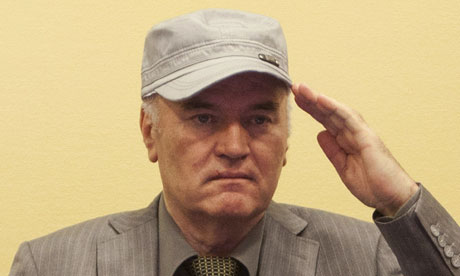
Ratko Mladic at the UN war crimes tribunal in The Hague, where he is accused of genocide over the Srebrenica massacre. Photograph: Serge Ligtenberg/Getty Images
Ratko Mladic, the Bosnian Serb warlord of the 1990s, goes on trial for genocide next week at the UN war crimes tribunal in The Hague, almost 17 years after his forces sealed control of eastern Bosnia through the mass murder of more than 8,000 Muslims at Srebrenica.
Following a decision in Sarajevo this week, however, Mladic's followers are poised finally to take political power in the small hilltown whose name has joined Guernica and Oradour in the horrors of history lists.
Deciding on the conduct of local elections in Bosnia in October, the country's election authority declined to make Srebrenica an exception that would have enabled native Bosnian Muslims who escaped the slaughter to vote for the mayor there.
Srebrenica is an exceptional place, the sole site in the 1992-95 war where the gravest crime of all, genocide, was perpetrated, according to the judges at the international tribunal. Mladic's political boss, Radovan Karadzic, is also being tried on genocide charges in The Hague because of his perceived responsibility for the Srebrenica massacre.
The town was granted exceptional status in 2008, allowing Bosnian Muslims from Srebrenica but no longer living there to vote in the local elections.
The result is Srebrenica has a Bosnian Muslim mayor, Camil Durakovic. But the likelihood is that from October the town will fall under a Bosnian Serb mayor and a government in denial about Europe's worst atrocity since the Nazis.
"We want the people who were born here and who had to escape the mass murder to be able to vote in Srebrenica," said Durakovic. "Otherwise the town will be taken over by politicians who propagate lies, who negate the genocide."
During the war, Srebrenica was a Muslim enclave in an area controlled by the Serbs until Mladic's forces overran it in July 1995 and murdered 8,100 men and boys in just a few weeks. Srebrenica remains a form of enclave, a Bosnian Muslim-governed island in the Serb half of Bosnia, whose strongman leader, Milorad Dodik, plays down the crimes committed and regularly calls for the breakup of Bosnia-Herzegovina.
This week's decision on the running of the election looks final, but could be overturned by the international powers who continue to wield last-resort absolute authority in Bosnia, although they are reluctant to use it. Valentin Inzko, the Austrian diplomat who is the international high representative, is said to be sympathetic to the Bosnian Muslim case, but has been overruled by western ambassadors in Sarajevo who believe Bosnia's feuding politicians need to sort out their problems and stop passing the buck to the international community almost two decades after the end of the war.
"It is not viable for the international community to care more for the electorate than the politicians themselves," said a western diplomat. "It must be up to the parties to deal with a situation like this in a timely and co-ordinated manner, not rely on the international community to impose solutions last-minute."
The Americans have taken the lead on the controversy, say western diplomats, and have opposed awarding Srebrenica a special status.
"Unfortunately, the Americans don't want to support us this year," said Durakovic. "This is a legal, political, moral, and humanitarian question. The international community has its obligations. But it is not on the side of the victims."
There were 30,000 Bosnian Muslims in Srebrenica before the war, 80% of the population. There are now little more than a 10th of that, with the population split roughly evenly between Bosnian Muslims and Serbs. But Durakovic said the electoral rolls showed Bosnian Serbs outnumbering Muslims 2-1.
The Muslims who escaped the massacre live mainly in the other half of Bosnia, the Muslim-Croat federation. The two main parties there, the governing social democrats and the Muslim-dominated Democratic Action Party, are accused of doing little to resolve the issue in favour of the Srebrenica Muslims, not least because it could dent their voter support elsewhere in their own half of the country.
"We need to get the election law changed … Srebrenica needs to be an exception," said Emir Suljagic, who survived the massacre and wrote a memoir about his experiences in 1995. "We can't allow genocide to be a way of legalising and legitimising the takeover of bits of this country."

No comments:
Post a Comment